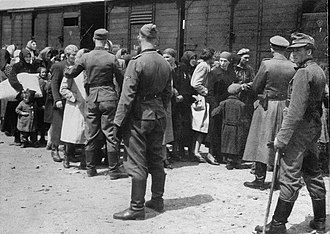Stefan Baretzki
His murders were sensationalized in the German press, taking the focus off of the systematic crimes of the Nazi regime.
[4] With other Volksdeutsche guards, he was shown antisemitic propaganda films such as Jud Süß and Ohm Krüger after work.
Baretzki stated at his trial that when Volksdeutsche guards asked why prisoners were sent to Auschwitz, they were told that all of them were dangerous criminals convicted of sabotage.
[5] According to Rebecca Wittmann, Baretzki's admission that he knew that the mass murder of Jews was illegal sealed his conviction.
He held them instead in a quarantine block until they died, not even allowing them to enter the barracks because the starving prisoners would create a mess.
[9] However, at other times, he attempted to help inmates, such as bringing water to women confined to "Mexico",[10] an especially primitive section of the camp lacking the most basic facilities.
[12] Ryszard Henryk Kordek, a prisoner, contradicted this saying that Baretzki had raised the alarm over Pestek's return, and was one of the guards who beat him.
[13] During the liquidation of the Theresienstadt family camp in July 1944, Baretzki asked his superiors to spare the lives of the children imprisoned there.
Asked to explain his actions at his trial, Baretzki stated that he had often attended theatrical performances at the children's block in the family camp.
[14] After the evacuation of Auschwitz, Baretzki was transferred to the SS division "30 January" and captured by Soviet forces in early May.
[15] He was the lowest-ranking of twenty-four men indicted at the Frankfurt Auschwitz trials; his defense attorneys were Eugen Gerhardt and Engelbert Jorschko.
[17] As one of the more brutal SS guards, Baretzki could be proved to have murdered on his own initiative and therefore received a harsher sentence than many of his superiors.
[18] In the German press, gruesome stories of the brutality of individual guards, including Baretzki, came to overshadow the larger point of prosecutor Fritz Bauer: that every SS guard, even those who did not personally commit shocking acts of sadism, was a voluntary participant in the system of extermination.
Called as a witness, Baretzki testified that Knittel had said that Jewish women and children had to be murdered because they were of an inferior race.
